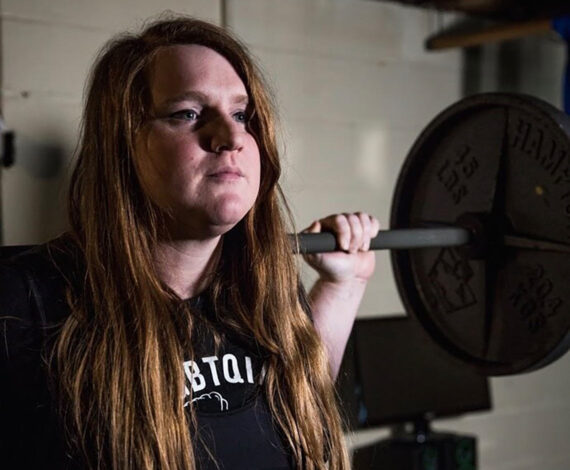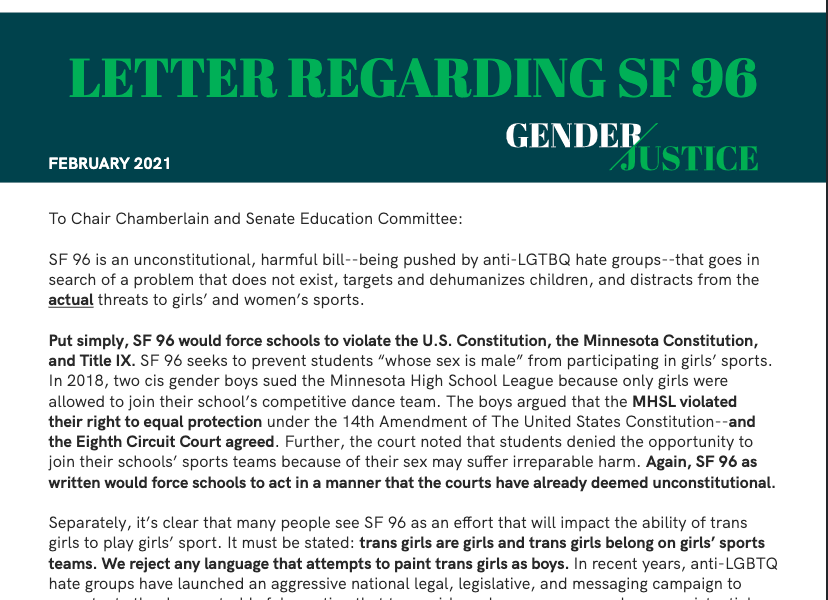
Cooper v. USA Powerlifting:
To Chair Chamberlain and Senate Education Committee:
SF 96 is an unconstitutional, harmful bill–being pushed by anti-LGTBQ hate groups–that goes in search of a problem that does not exist, targets and dehumanizes children, and distracts from the actual threats to girl’s and women’s sports.
Put simply, SF 96 would force schools to violate the U.S. Constitution, the Minnesota Constitution, and Title IX. SF 96 seeks to prevent students “whose sex is male” from participating in girls’ sports. In 2018, two cis gender boys sued the Minnesota High School League because only girls were allowed to join their school’s competitive dance team. The boys argued that the MHSL violated their right to equal protection under the 14th Amendment of The United States Constitution–and the Eighth Circuit Court agreed. Further, the court noted that students denied the opportunity to join their schools’ sports teams because of their sex may suffer irreparable harm. Again, SF 96 as written would force schools to act in a manner that the courts have already deemed unconstitutional.
Separately, it’s clear that many people see SF 96 as an effort that will impact the ability of trans girls to play girls’ sport. It must be stated: trans girls are girls and trans girls belong on girls’ sports teams. We reject any language that attempts to paint trans girls as boys. In recent years, anti-LGBTQ hate groups have launched an aggressive national legal, legislative, and messaging campaign to perpetuate the demonstrably false notion that trans girls and women are somehow an existential threat to girl’s sports. Let’s be clear: trans children belong in — and are already participating in — sports. Organizations like the International Olympic Committee, the NCAA, and the Minnesota State High School League all have policies that allow trans athletes to compete.
Transgender students participate in sport for the same reason as their cisgender teammates — for the physical and mental health benefits it brings, the invaluable lessons of teamwork and discipline, and lifelong friendships. We’re all aware of the painful way discrimination has shown up in sports, whether it’s junk science used to justify excluding women from sports; racism used to exclude Black athletes, or antisemitic tropes used to demonize Jewish athletes and assert they had an unfair advantage in sports. Many sports institutions and governing bodies have worked to craft trans inclusive policies, including the Minnesota State High School League, and trans girls and women have been competing in sports for decades without issue.
Recently, the Minnesota Court of Appeals held that it is a violation of the Minnesota Constitution for schools to segregate transgender students from their peers and force them to use locker rooms and bathrooms based on their sex assigned at birth. The Minnesota State Constitution ensures that transphobic policies have no place in Minnesota schools.
Further, policies that discriminate against students are not self-executing: they compel individual educators, coaches, and other public school employees to carry them out. Educators suffer both professional and psychological harms when they are forced to watch, and participate in, the stigmatization and degradation that discriminatory policies inflict on children. What’s more, legislating discrimination against one group of students infects anti-discrimination efforts against others. Schools cannot embrace diversity, inclusion, and mutual respect in some ways, but deny it in others and still obtain the benefits of inclusive learning environments. Students who see their transgender peers being treated as “less than” justifiably fear that they one day will be treated as ‘less than’ as well.
As such, we respectfully urge this committee to consider the harm done to the children of this state when lawmakers put up the humanity and worth of some students for debate. A 2018 study found that nearly 3 percent of Minnesota high school students do not identify as the gender they were assigned at birth. By even considering SF 96, the Senate Education Committee, and the Minnesota State Senate as a whole, have singled out 3% of Minnesota high school students for discrimination and dehumanization. This committee’s decision to publicly elevate arguments rooted in hate and transphobia inflicts lasting damage to LGBTQ+ students–especially trans students–who are already facing increased stress and isolation during COVID. Perhaps ironically, sport–the very subject being debated in committee today–is proven to reduce depression and anxiety. Every child deserves the same access and opportunity to have their life changed for the better. It’s important that transgender youth can continue to experience the social, physical, and cultural benefits of athletics.
To be clear, there are very real threats to girls’ and women’s sports – racism, pay inequities, sexual abuse, and lack of athletic opportunities in schools, to name a few — but trans athletes competing is not one. If the Senate Education Committee is interested in supporting girls and women’s sports, they should focus their energy on addressing systemic racism and sexism, fully funding public schools, and passing comprehensive sex and consent education–all of which are would go along way in supporting girls’ and women’s sports.
Girls’ and women’s sports are stronger when we prioritize equity and inclusion. We ask that you reject SF 96.
Sincerely,
Erin Maye Quade
Advocacy Director, Gender Justice
Cooper v. USA Powerlifting:
